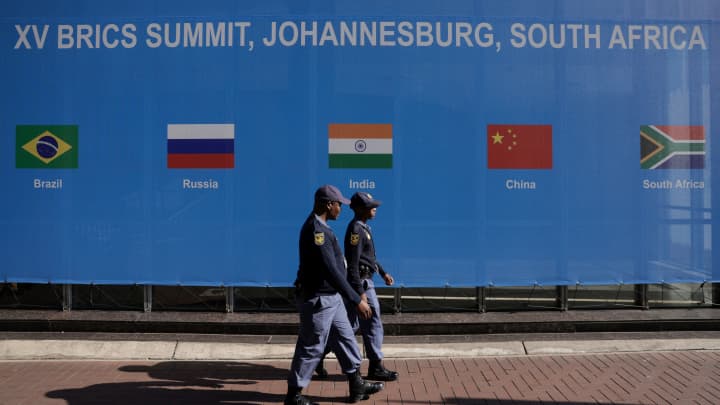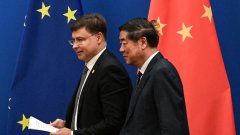
Leaders from five developing nations accounting for nearly half the world's population are gathering in Johannesburg Tuesday for the 15th BRICS Summit with expansion of the emerging market grouping, the war in Ukraine and relations with the West all high on the agenda.
Hosted by South African President Cyril Ramaphosa, the current BRICS chair, the meeting will convene Chinese President Xi Jinping, Brazilian President Luiz Inácio Lula da Silva, Indian Prime Minister Narendra Modi and Russian Foreign Minister Sergei Lavrov.
Russian President Vladimir Putin will join virtually as he is currently subject to an arrest warrant from the International Criminal Court for war crimes. As an ICC signatory, South Africa would have been required to honor the warrant had Putin arrived in the country.
Ramaphosa invited 67 leaders from across Africa, Latin America, the Middle East, Asia and the Caribbean to attend the summit, but no Western leaders received an invitation. The U.N. secretary-general, chair of the African Union Commission and president of the New Development Bank were also invited along with over a dozen other dignitaries and a host of business leaders.
A central focus of the summit will be the possible expansion of BRICS, with more than 40 countries expressing interest in joining, including major economic hubs and emerging geopolitical powers such as Nigeria, Saudi Arabia and Iran.
A total of 23 countries have formally applied to become new BRICS members, including Saudi Arabia, Iran, the UAE, Argentina, Indonesia, Egypt and Ethiopia, while major African players such as Nigeria and Ghana have informally expressed interest but so far stopped short of a formal application.
However, the informal nature of many expressions of interest so far highlights the straddling of a perceived global divide that many countries are attempting to navigate.
Gustavo de Carvalho, policy analyst and senior researcher at the South African Institute of International Affairs, said final decisions on new members are unlikely to emerge from this week's two-day summit, but the aim will be to establish a clear process, criteria and timeframe for applications and admittance.
Speaking to CNBC via telephone from Johannesburg on Monday, de Carvalho noted that there are differing views on expansion among the existing members of the collaborative but amorphous bloc.
"India historically has been the country that mostly worries about the idea of expansion, and particularly with the fears that this would be used as increasing the Chinese influence within BRICS, and Russia is in a space where it's very isolated in the international community so it became much more vocal in accepting the issue of the expansion," de Carvalho explained.
He added that while Brazil for some time seemed neutral around the idea of expansion, the Lula administration has voiced some concern around potentially diluting the group to the point that it loses its effectiveness in providing a unified voice.
In a televised national address on Sunday, Ramaphosa explicitly supported expansion for the first time, particularly for fellow African nations that have long been part of "BRICS+" discussions among emerging economies.
In light of the punitive Western economic sanctions against Russia in response to its invasion of Ukraine, particularly the freezing of Russian assets, de Carvalho said other BRICS and affiliated countries were keen to reduce their risk exposure in the international financial system, and to find ways to collectively shore up their respective currencies and liquidity positions.
Russian and Chinese officials have struck an increasingly anti-Western tone in their characterizations of what the BRICS bloc represents over the past year, as they look to build support for a broad coalition to challenge U.S. dominance over the global political and economic system.
Though some analysts have suggested the BRICS may take a significant anti-Western turn, South Africa, India and Brazil have signaled intention to maintain closer ties with traditional Western partners, which de Carvalho said highlights the continued independence of constituent countries to prioritize their own interests with regards to diplomacy and international trade.
Some reports have cited Chinese officials as openly aiming to position BRICS as a direct geopolitical rival to the G7. Yet in his televised address on Sunday, Ramaphosa insisted South Africa would "not be drawn into a contest between global powers" and sought to retain its independence in a world "increasingly polarized into competing camps."
The BRICS group operates on consensus and tends to collaborate on certain aspects of its various economies where interests align, rather than seeking to form a unilateral "alliance," de Carvalho noted. In this vein, he said Ramaphosa's speech was particularly important in differentiating Pretoria's desire for a positive relationship with the West from the notion of a collective anti-Western shift.
Bilateral deals and cooperation is common among BRICS members, but de Carvalho challenged the idea that there is a unanimous desire to compete with the G7.
He argued that the aim instead is to represent the voice of five nations that cumulatively account for around 40% of the global population, based on the belief that "international politics should not be entirely controlled by a group of the seven most important industrialized economies," of which India and China could well be members.
"It's not really about changing the global order, I think it's much more perception of the fact that the global order has already changed but our voice is still not nearly close enough to what we believe that we should be influencing global decisions," de Carvalho said.
"So this is not just these countries in the global south whining about the role of the West that I think has much more to do with their own perception of capabilities and influence that they feel that they already have."
He added that the BRICS members do not always agree and do not see the group as a "panacea," but simply a "vehicle to become more influential in global discussions."
"So for me, it's not that BRICS would ever replace G7, but I wouldn't be surprised if, for instance, and I think it would be potentially in a couple of years, a really good move is to start having meetings between BRICS and the G7."
Yet Steven Gruzd, head of the African governance and diplomacy programme at the SAIIA, told CNBC on Monday that BRICS "already is a rival to the G7" insofar the bloc has established itself as one of the pre-eminent voices of the emerging economies.
"The G7 contains the rich Western economies, while BRICS contains the two most populous countries and the leading countries on three continents. Both blocs are seeking influence and support on the global stage. Whether the rivalry becomes geopolitical remains to be seen," Gruzd said.
"We have witnessed the world dividing into three camps due to the Russian invasion of Ukraine – pro-West, pro-Russia-and-China and non-aligned. In my view, these splits are set to continue and widen, especially as the non-aligned face enormous pressure to join the other camps."
Though much of the narratives surrounding BRICS focus on the growing Chinese and Russian influence across emerging economies, de Carvalho suggested there is a mistaken assumption that China has "unlimited influence" within the other BRICS societies, which is "definitely not the case."
"I think very clear that the competition and tension with India plays a major role within the BRICS dynamics and especially when it comes to some of the Indian fears of increased influence of China within the group and so on," he said.
Evidence of the freedom of BRICS countries to chart their own courses on global issues has been highlighted in responses to Russia's war in Ukraine, which de Carvalho said provided an opportunity in particular for other BRICS countries to "potentially serve as a bridge or a conduit for dialog."
South Africa and China have separately held talks with Moscow and Kyiv in a bid to bring both sides of the conflict to the negotiating table, while India and Brazil have condemned the aggression but also pushed for a negotiated settlement rather than aligning with the West behind Ukraine. Separately, India has cooperated with Washington in opposing what they see as Chinese aggression in the Indo-Pacific.
"It is often useful to reflect on what BRICS is not: BRICS is not an alliance. None of the countries within BRICS see it as an alliance, like NATO, or any other kind of global alliance," de Carvalho insisted.
"I think my hope for this summit is that we start getting more nuanced discussions around what BRICS is and what BRICS is not, and I think that can only be helpful for the international community more globally, because it does get a much better sense of what this institution is and how can we engage with that."




